hankyoreh
Links to other country sites 다른 나라 사이트 링크
N.Korea follows familiar pattern with statement of regret and blame

By Son Won-je, Staff Writer
Four days after launching an artillery strike on Yeonpyeong Island, North Korea said in an editorial statement in the state-run Korea Central News Agency (KCNA) that if it is true that civilians were killed in the artillery strike, it was very regrettable. This is the first time the North Korean media has mention the killing of civilians in the strike and expressed regret, even if hypothetically. North Korea passed responsibility onto South Korea, however, saying that the responsibility rested with the South Korea’s inhumane treatment in which it created a human shield by placing civilians around its artillery positions and in military facilities while preparing its provocation.
After making this claim in the editorial, entitled “Who Was the Ringleader Who Caused the Military Clash,” the KCNA said South Korea violated North Korea’s territorial seas and land by pushing ahead with a live fire artillery drill in very sensitive disputed region despite repeated warnings. It claimed the shelling of Yeonpyeong Island was justified, saying the North Korean strike in response was a firm and natural punishment for South Korea’s reckless military provocation.
The hypothetical expression of regret, limited to just the civilian deaths and made four days after the shelling through the state media, not the responsible authorities, is believed to be a response for outside consumption with South Korea’s and the international community’s strong criticism of the North indiscriminate shelling that killed even civilians in mind. Some believe that North Korea is considering taking additional measures at the government level after feeling out opinion through announcing its regret in an unofficial media editorial,
South Korean authorities shot the North Korean statement down Sunday, saying it was nothing more than a hypothetical mention of regret, made by something other than the North Korean authorities, issued while blaming South Korea for the shelling.
It is rare, but North Korea has previously expressed regret when the situation on the Korean Peninsula was aggravated due to its own military provocation.
In the first year of Lee Myung-bak’s presidency, on July 12, 2008, the day after South Korean tourist Park Wang-ja was shot to death in the Kumgang Mountains, North Korea expressed regret while explaining what happened through a statement by a spokesperson for the Guidance Bureau for Comprehensive Development of Scenic Spots, which is the North Korean business entity that handles the resort. It was a prompt response, but North Korea then refused South Korea’s demand for an investigation and instead demanded South Korea apologize. The government did not accept this, and the Mt. Kumgang tourism project has yet to restart.
When the Second West Sea Naval clash took place on June 29, 2002, the day before the end of the 2002 World Cup, North Korea immediately picked up the inter-Korean hotline and said it believed the accidental incident caused by subordinates on the ground was very regretful and that it would work to see that such incidents did not happen again. On July 25 of that year, North Korea expressed regret in a statement sent in the name of Kim Ryong-song, the head of North Korea’s delegation for ministerial-level talks, and in August of that year, the seventh round of ministerial-level talks were restarted.
When a North Korean submarine carrying 26 men ran aground in the seas off Gangneung on the east coast of South Korea on Sept. 18, 1996, North Korea said six days later it was an accident. The Kim Young-sam administration, which called it an “intentional provocation,” did not accept this, and inter-Korean tensions continued. After three weeks of intensive talks with the United States, North Korea made an official statement of “deep regret” through a Foreign Ministry spokesperson’s statement on Dec 29. One factor was that the problem was discussed not through inter-Korean dialogue, but by North Korea and the United States as a four-party problem.
Please direct questions or comments to [englishhani@hani.co.kr]
Editorial・opinion
![[Column] Has Korea, too, crossed the Rubicon on China? [Column] Has Korea, too, crossed the Rubicon on China?](https://flexible.img.hani.co.kr/flexible/normal/500/300/imgdb/original/2024/0419/9317135153409185.jpg) [Column] Has Korea, too, crossed the Rubicon on China?
[Column] Has Korea, too, crossed the Rubicon on China?![[Correspondent’s column] In Japan’s alliance with US, echoes of its past alliances with UK [Correspondent’s column] In Japan’s alliance with US, echoes of its past alliances with UK](https://flexible.img.hani.co.kr/flexible/normal/500/300/imgdb/original/2024/0419/2317135166563519.jpg) [Correspondent’s column] In Japan’s alliance with US, echoes of its past alliances with UK
[Correspondent’s column] In Japan’s alliance with US, echoes of its past alliances with UK- [Editorial] Does Yoon think the Korean public is wrong?
- [Editorial] As it bolsters its alliance with US, Japan must be accountable for past
- [Guest essay] Amending the Constitution is Yoon’s key to leaving office in public’s good graces
- [Editorial] 10 years on, lessons of Sewol tragedy must never be forgotten
- [Column] A death blow to Korea’s prosecutor politics
- [Correspondent’s column] The US and the end of Japanese pacifism
- [Guest essay] How Korea turned its trainee doctors into monsters
- [Guest essay] As someone who helped forge Seoul-Moscow ties, their status today troubles me
Most viewed articles
- 1[Column] The clock is ticking for Korea’s first lady
- 2After 2 months of delayed, denied medical care, Koreans worry worst may be yet to come
- 3[Column] Has Korea, too, crossed the Rubicon on China?
- 4[Correspondent’s column] In Japan’s alliance with US, echoes of its past alliances with UK
- 5Samsung barricades office as unionized workers strike for better conditions
- 6All eyes on Xiaomi after it pulls off EV that Apple couldn’t
- 7US overtakes China as Korea’s top export market, prompting trade sanction jitters
- 8Hong Se-hwa, voice for tolerance whose memoir of exile touched a chord, dies at 76
- 9[Photo] Smile ambassador, you’re on camera
- 10[Editorial] When the choice is kids or career, Korea will never overcome birth rate woes